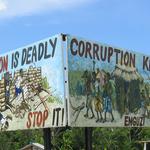Does democracy reduce corruption?
How to cite this publication:
Ivar Kolstad, Arne Wiig (2011). Does democracy reduce corruption? Bergen: Chr. Michelsen Institute (CMI Working Paper WP 2011:4)
While democracy is commonly believed to reduce corruption, there are obvious endogeneity problems in measuring the impact of democracy on corruption. This paper addresses the endogeneity of democracy by exploiting the common observation that democracies seldom go to war against each other. We instrument for democracy using a dummy variable reflecting whether a country has been at war with a democracy in the period 1946-2009, while controlling for the extent to which countries have been at war in general. We find that democracy to a significant extent reduces corruption, and the effect is considerably larger than suggested by estimations not taking endogeneity into account. Democracy is hence more important in combating corruption than previous studies would suggest.



